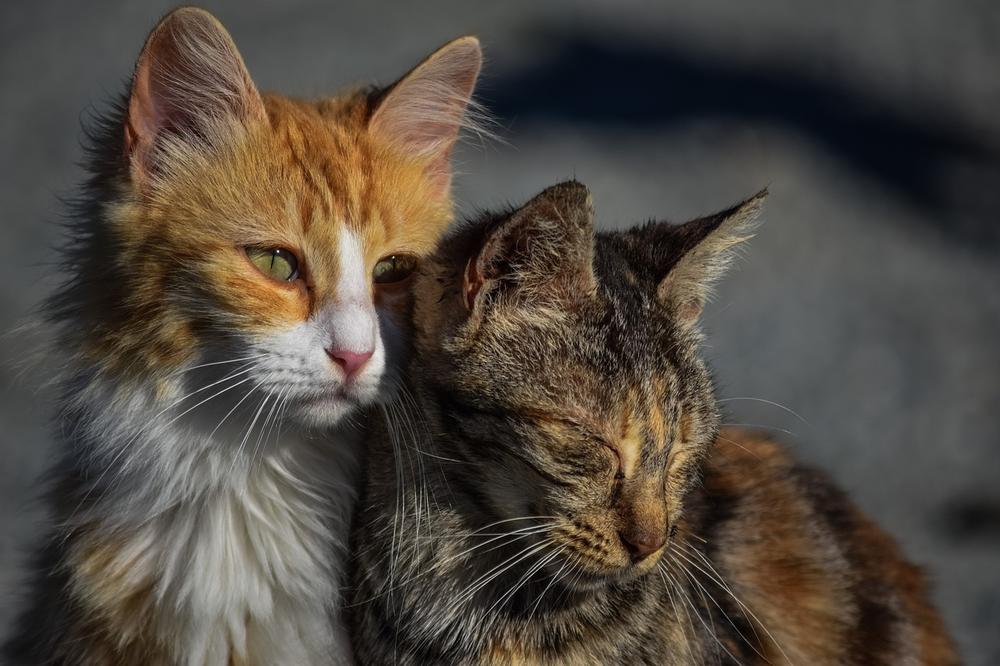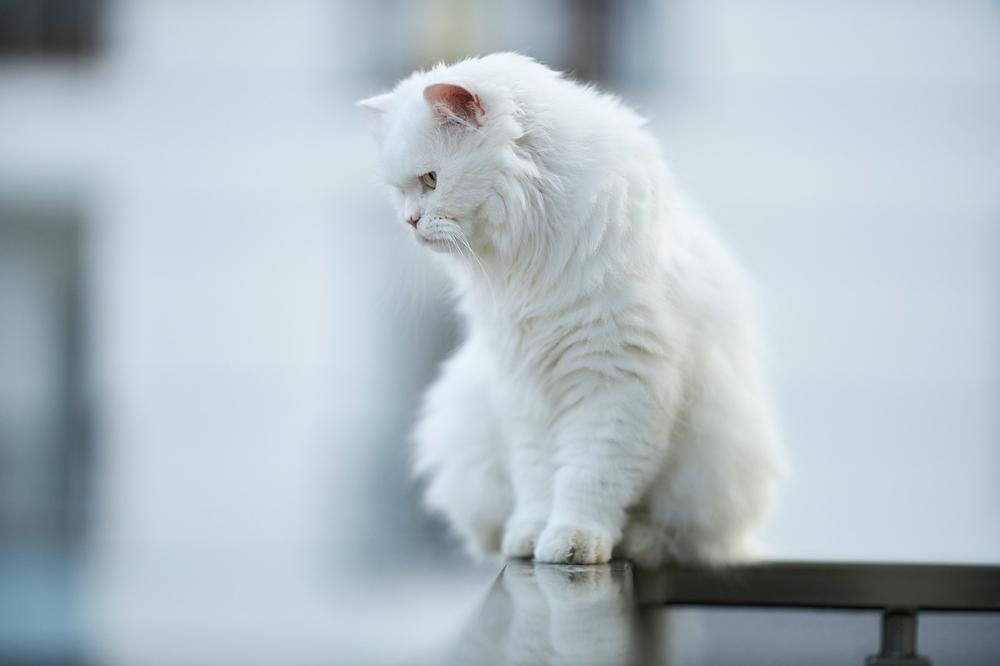Stress in Cats: Signs, Causes & How to Manage It

Stressed out by your furry feline companion?
You're not alone.
Ever caught yourself thinking, "Why is my cat acting like a diva?"
Well, let's dive into the world of feline stress and find some solutions, shall we? 😺
Effective Strategies for Managing Cat Stress
If you want your cat to be happy and stress-free, here's what you need to do:
- Give them choices: Let your cat decide on their food, water, toys, and where they want to rest.
- Get advice from experts: If your cat is acting out, consult professionals who can give you expert guidance.
- Stick to routines: Cats love consistency, so establish a daily routine with set meal times, play sessions, and quiet time.
- Understand their emotions: Take the time to understand what makes your cat feel safe, loved, and comfortable.
- Make their environment stimulating: Create vertical spaces, hiding spots, scratching posts, and interactive toys that mimic their natural habitat.
- Beat boredom with interactive feeding: Use puzzle feeders and treat-dispensing toys to keep your cat entertained and mentally stimulated.
- Engage in enrichment activities and playtime: Regularly play with your cat to stimulate their hunting instincts and provide exercise and socialization opportunities.
- Keep their space clean and safe: Clean litter boxes regularly, use calming diffusers or stress relief supplements, and provide a calm and secure environment to prevent aggression.
- Provide a dedicated safe room: When moving or introducing your cat to a new place, give them a specific area where they can feel secure and unwind.
Implementing these tactics will aid your cat in coping with anxiety and lead to a greater sense of contentment.
Main points I'll expand upon further down this article:
- The HPA axis and sympathetic nervous system regulate stress in cats.
- Cats can experience real and chronic stress, so observation is key.
- Signs of stress in cats include changes in behavior and physical appearance.
- Acute stress is caused by unexpected incidents, while chronic stress develops over time.
- Cats may lack facial expressions, making it difficult to spot signs of stress.
- Contact a vet if a cat is suspected of experiencing stress to rule out medical issues.
- Fears or phobias can also stress out cats.
- Environmental factors and changes contribute to stress in cats.
- Preventing stress involves gradual introductions and addressing territorial threats.
- Stress can impact a cat's health and behavior, requiring vet attention.
Now that you have implemented effective strategies for managing your cat's stress, it's time to dive deeper and understand the unique triggers and sensitivities that each feline friend may have.

By closely observing their behavior and body language, you can decode their individual sources of stress.
Let me guide you through the fascinating world of the HPA axis and sympathetic nervous system in cats' stress regulation.
Excited to learn more?
Understanding Stress in Cats
Each cat has their own unique stress triggers and sensitivities.
To truly understand what stresses them out, you must closely observe their behavior and body language.
The HPA axis and the sympathetic nervous system play crucial roles in regulating stress in cats, just like they do in us humans. Recognize that our feline friends can experience real and chronic stress.
By understanding their specific stress triggers and creating a nurturing environment, we can ensure their well-being and happiness.
Pay close attention to their body language, for it holds valuable insights into what brings them joy.
And if you find that your stress-free cat suddenly exhibits aggressive behavior towards her kittens, don't worry.
I've got you covered.
Understanding why cats hiss and growl at their little ones can be confusing.
That's why I've written an in-depth article Why Is My Cat Hissing and Growling at Her Kittens that delves into this issue.
So, if you want to uncover the secrets behind your cat's behavior, I highly recommend checking out my article.
You'll find all the answers you're looking for!
Signs of Stress in Cats
Watch out for changes in grooming habits. Sometimes cats just love to lick themselves.
And that's totally normal!
But if they start excessive licking or grooming in one spot, it could mean they're stressed or anxious.
Poor little kitties, they sometimes take their stress out on their own fur.
Be on the lookout for subtle signs of stress. Cats can be sneaky little creatures, and when they're stressed, they tend to become quiet and withdraw.

So keep an eye out for any weird or unusual behaviors, because it could be your furry friend trying to tell you something. Pay attention to changes in behavior, physical appearance, and body language as these might indicate that your cat is feeling stressed.
Keep an eye out for other signs of stress.
While cats may not have a huge range of facial expressions like us humans, they still give away signs when they're stressed. Things like avoiding interaction, going potty outside the litter box (not cool, Fluffy), changes in eating habits, aggression, constant meowing—the list goes on.
Now, I'm not suggesting that every time your cat hisses at you, it means they're stressed (although it could mean that...), but it's definitely worth keeping an eye out for these signs.
Also, remember that stress in cats can also be caused by underlying medical conditions.
If you notice any of these signs, it's always a good idea to contact your vet and get their expert advice.
After all, nobody wants a stressed-out kitty.
Causes and Prevention of Stress in Cats
To keep your cat stress-free, here's what you should do:
- Get your cat used to seeing carriers and going to the vet.
- Bring comforting scents from home to vet visits.
- Keep things as calm as possible at the vet's office.
- Understand all the things that can make your cat stressed out.
- Know that genetics and their surroundings can impact their stress levels.
- Make up for any missed socialization opportunities in the past.
- Think about any big changes in their life, like new owners or a different environment.
- Be aware of how moving houses or adding new pets can affect them.
- Pay attention to anything that disrupts their routine, smells, or dynamics at home.
- Reduce stress by managing how they interact with other cats and people.
Remember these steps to keep your feline friend stress-free.
Take it slow when making changes and consider the other cats already there.
Deal with territorial issues, give them enough resources, and stay consistent.
If you need help, reach out to a vet or behavior expert for guidance.
Keep your kitty's happiness and wellbeing a top priority to minimize stress. 😺
To ensure a stress-free environment for your beloved feline companion, there are various steps you can take.
From understanding the causes of stress to maintaining a consistent routine at home, every choice you make can make a difference.
However, there may still be unanswered questions lingering in your mind.
That's when I urge you to explore my useful blog post on whether cats poop or pee when they are scared or stressed.
Discover valuable insights and satisfy your curiosity by delving into the world of feline behavior.
Embrace your proactive nature and enhance your knowledge with the informative guidance provided in my article: Do Cats Poop Pee When They Are Scared or Stressed.
Impact of Stress on Feline Health
Stress can have a huge impact on your cat's health.
We already talked about the causes, prevention, and signs of stress in cats, so now let's talk about how stress affects their well-being.
Chronic stress weakens their immune system, making them more prone to illnesses and infections. 😿
It can also lead to physical conditions like stress cystitis, which is painful for your feline friend.
Behavioral problems may arise as well.
But it doesn't stop there.

Long-term stress can actually worsen existing medical conditions and decrease your cat's in essence quality of life.
Pregnant cats can even pass on their stress response to their kittens.
That's why regular vet checkups are crucial - they help catch any health issues early.
If you notice any concerning physical symptoms or behavioral changes in your cat, ensure to bring them to the vet for proper diagnosis and treatment. Don't ignore male cats struggling to use the litter box either, as it could be a sign of a serious problem.
Cats may experience stress due to illness, injury, discomfort, or pain.
Older cats might vocalize more due to discomfort or cognitive changes.
Regular vet checkups become even more important for monitoring physical health and managing the aging process.
And that wraps up today's article.
If you wish to read more of my useful articles, I recommend you check out some of these: Cat Behavior After Mating, Why Is My Cat Bullying My Dog, Cat Scratching Side of Litter Box, Why Cat Ducks When I Pet Him, and Why Does My Cat Guard Me
Talk soon,
-Sarah Davis